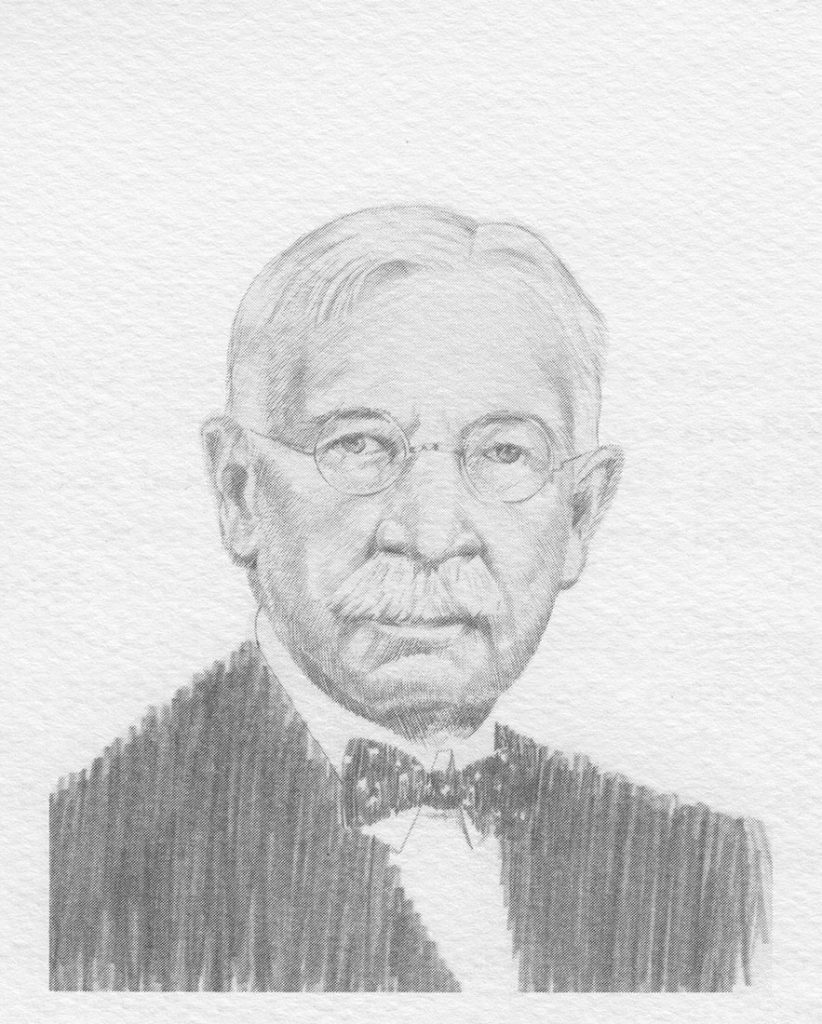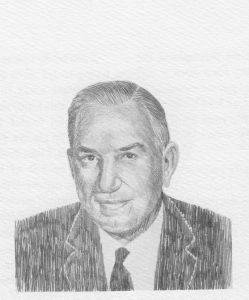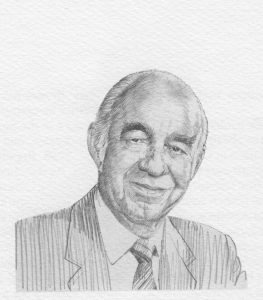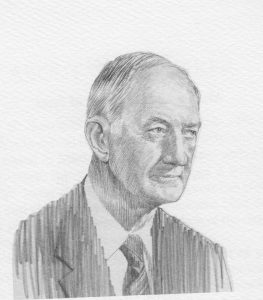William Dorsey Jelks has been described as a man with ability, integrity, and a habit of action – a man sensitive to human needs but also a very bold and determined man. These qualities become readily apparent in the story of his accomplishments in journalism, politics, and business.
This distinguished Alabamian was born to Joseph William and Jane Goodrun (Frazer) Jelks in Warrior Stand, Macon County, Alabama, on November 7, 1855. Young William’s father, a captain in the Confederate Army, was killed in 1862. Subsequently, the youngster grew up in Union Springs in Bullock County where he was educated in the common schools. Loans from kind relatives enabled him to enter Mercer University in 1873 from which he graduated in 1876. He returned to Union Springs and worked as a bookkeeper to pay off the money he had borrowed.
In 1879, William Jelks acquired an interest in the Union Springs Herald, but sold his shares and moved to Eufaula later that same year. He bought the Eufaula Times. He was highly successful both as an editor and publisher. His newspaper is said to have been probably the most often quoted of the state’s newspapers. William Jelks stated later that in the nineteen years he owned and published the Eufaula Times, he acquired a “country competency.”
Long before William Jelks entered politics at the state level, he had shown an active interest in public affairs. When he was twenty-two, he was a member of the Union Springs common (town) council. In Eufaula he served from six to eight years on the school board and held the honorary title of superintendent of education. Through his editorials, he had become widely and favorably known.
In 1898 he ran for and was elected to the Barbour County seat in the state senate. In 1900, he aspired to be the president of the state senate and again was successful. This victory was a much more important one than appears on the surface because it was generally known that Governor-elect William J. Samford suffered from what was presumed a fatal illness, and in those days the president of the senate was the first officer in line for succession. Senator Jelks indeed took the oath of office in Samford’s stead and served the first thirty days of the term. Then the elected governor regained enough strength to take over and serve until his death six months later.
When the two-year term to which he had succeeded neared its end, William Jelks became a candidate to succeed himself and was elected to what was then a four-year term.
Both as State Senator and Governor, William Jelks exerted a major influence on the new constitution of 1901. He was chairman of the senate committee which drafted the enabling act and the elected chairman of the joint legislative committee which revised the bill. He signed it both as president of the Senate and as Governor. As Governor, he had, perforce, to demonstrate the workability of the new constitution.
William Jelks earned the reputation as Alabama’s “Business Governor.” When the state bonded debt of $8.5 million fell due during his term, he refunded it. He affected the refund with a saving of $100,000 a year in interest and got a premium of $300,000 in addition. He encouraged the passage of a uniform schoolbook law, which saved the state hundreds of thousands of dollars. He found no surplus in the State Treasury when he went in office, but he left about S1.8 million when he went out.
But this business-like executive was also a humanitarian. During his term, child labor legislation began. Appropriations for education were about twice as large as during any previous six years, and old soldiers’ pensions were quadrupled.
After Governor Jelks left office in January 1907, a new challenge beckoned. As Governor, he had read the reports of the Insurance Commissioner and noted the volume of insurance premiums going out of the State with no such premiums coming in. Though he probably never used the term “balance of payments,” he understood the idea, grasped the unfavorable position of his state and set about improving it. He conceived the idea that there should be a strong life insurance company in Alabama. He moved to Birmingham and organized a life insurance company, with himself as president. He drew to him strong support. His first board of directors, thirty in number, reads like a roster of the foremost leaders of the time in Alabama. The company was capitalized at a hundred thousand dollars, with a paid-in surplus of twenty-five thousand, no small sum for the time and place. It was incorporated on July 26, 1907, and issued its first policy on September 3, 1907. The selection of the name, “Protective,” for the new company was a touch of genius, for the company was founded in a period of financial panic when all men yearned to be protected.
The new company had a hard time. Because of one of the sharpest money and banking panics in U.S. history, most banks were limiting cash withdrawals from individual accounts to around $50. All of the South’s large cities, including Birmingham, issued clearing house certificates to take the place of currency. The financial conditions were further aggravated by the fact that established northern companies were in firm possession of the insurance field. It was indeed difficult to sell insurance.
William Jelks met the situation with caution, economy, and patience. He conserved his capital. He and his fellow subscribers to Protective stock absorbed all of the newborn company’s promotional and organization expenses. (The cost of the stamp on the envelope carrying the charter application to the secretary of state appears on the Company’s records as “Total Organization Expense, $.0 2”) The first home office was housed in one small room.
As he reported to stockholders in 1909, he believed that success in the insurance business lay in “making haste slowly.” The new company did not clamor for a large volume of business. Following a motto of “conservatism, consistently, persistently, and insistently,” Protective Life grew steadily and uninterruptedly throughout the twenty years that Governor Jelks was its president.
In 1927, Protective Life (often called “The Governor’s Company “) and Alabama National Life Insurance Company of Birmingham were consolidated. The united company retained the name “Protective.” Governor Jelks was made chairman of the consolidated company and F. Clabaugh (president of Alabama National) was the president. As chairman, seventy-two-year-old Governor Jelks turned all responsibilities over to the new president, except control of the Company’s investments. He was ready to retire. On January 1, 193 0, he gave up the chairmanship.
A few days later at a dinner given in his honor by his associates and friends, he bade farewell to his corporate child born twenty-three years before. In his words, Protective was his “own child … fed by me and my associates and nourished . . . It was an honest child and now is a strong and healthy one. All its early years I tried so to build that its foundations would hold any weight . . . let it live forever.”
William Dorsey Jelks went back to Eufaula to the home he had kept all those years. His productive life ended on December 13, 1931, but the fruits of his labors remain.
Sources of biographical information: A. B. Moore, History of Alabama, 1927; The Book of Alabama and the South, by John Temple Graves II, 1933. William J. Rushton, ”The Governor’s Company,” presented at the 1957 Alabama Dinner Meeting of the Newcomen Society in North America, Birmingham, Alabama.




